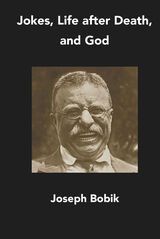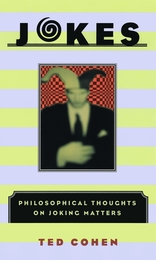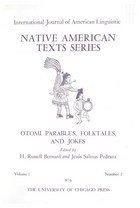3 books about Jokes

Jokes, Life after Death, and God
Joseph Bobik
St. Augustine's Press, 2020
Jokes, Life after Death, and God has two main tasks: to try to understand exactly what a joke is, and to see whether there are any connections between jokes, on the one hand, and life after death and God, on the other hand. But it pursues other tasks as well, tasks of an ancillary sort.
This book devises a general and comprehensive, but brief, theory of jokes. The author begins with critiques of other writers’ views on the subject. 1) Ted Cohen thinks that such a theory is impossible. 2) Ronald Berk, on the other hand, provides just such a theory. And 3) John Morreall provides a general theory of laughter, which may include some things which can be used in a general theory of jokes. 4) Neil Schaeffer, too, provides a general theory of laughter, which makes a big point out of what he calls the “ludicrous context”; but he does include a chapter on jokes. 5) Christopher Wilson offers a general theory of jokes in which he focuses on form and content. And 6) Thomas Werge, in reflecting on the comic, suggests a general theory of jokes which identifies their matter, form, agents, purposes, and beyond these, the underlying shared relational context, which makes it possible for jokes to arise. 7) Bill Fuller’s message is that there is more funniness coming out of two or more heads than out of one, just as Socrates’ message was that there is more clarity coming out of two or more heads than out of one. 8) Umberto Eco feels that monks should laugh, just as ordinary people do; for laughter not only refreshes our seeking spirits, it also illuminates the truth we seek. 9) Simon Critchley, in his reflections on humor, notes that jokes bring on a kind of everyday anamnesis, that they are anti-story stories, that they are like prayers, that they are like philosophy; and that they require a certain underlying context, which is implicitly recognized by both teller and listener, and which renders possible the tension needed to make the punch line work. 10) Martha Wolfenstein, pursuing a psychological analysis of children’s humor, proposes that the underlying motive for telling jokes remains the same from childhood to adulthood, i.e., to transform painful and frustrating experiences so as to extract pleasure from them; and that the agent or productive cause of jokes is the repressing unconscious, as suggested by Freud.
As John Morreall has argued, neither the Superiority Theory (as in Plato, Aristotle and Hobbes), nor the Relief Theory (as in Spencer and Freud), nor the Incongruity Theory (as in Kant, Schopenhauer and Kierkegaard) appears to work as a general and comprehensive theory. Moreover, these writers talk more about humor and laughter than about jokes. To be sure, a joke is a type of humor. Thus, to say something about humor is to say something, though of a generic sort, about jokes. Similarly, to say something about the laughter caused by humor is to say something, though generic, about the laughter caused by jokes. Most of the authors considered in chapter one are concerned with jokes, and not only with humor as such. Section 11 of chapter one puts together, out of the combined contributions of these authors, what can be considered the beginnings of, some thoughts toward, a general and comprehensive theory of jokes. This task the author illustrates in a concrete way, by looking at individual jokes of different sorts; not, however, without inviting the reader to enjoy these jokes. The author looks particularly at Jewish jokes, Christian jokes, and Islamic jokes (jokes in three major religious traditions), jokes about philosophy and philosophers (philosophers ought to be able to laugh at themselves and at what they do), yo mama jokes (out of a healthy curiosity), Italian jokes and Slovak jokes, all of which makes for a clearer understanding of exactly what a joke is.
The analysis of general theory is then followed by some views on the morality of jokes and joke-telling, and an analysis of the connection between jokes and life after death, on the one hand, and God, on the other. Throughout the book Bobik offers innumerable examples to heighten our understanding and entertain us.
This book devises a general and comprehensive, but brief, theory of jokes. The author begins with critiques of other writers’ views on the subject. 1) Ted Cohen thinks that such a theory is impossible. 2) Ronald Berk, on the other hand, provides just such a theory. And 3) John Morreall provides a general theory of laughter, which may include some things which can be used in a general theory of jokes. 4) Neil Schaeffer, too, provides a general theory of laughter, which makes a big point out of what he calls the “ludicrous context”; but he does include a chapter on jokes. 5) Christopher Wilson offers a general theory of jokes in which he focuses on form and content. And 6) Thomas Werge, in reflecting on the comic, suggests a general theory of jokes which identifies their matter, form, agents, purposes, and beyond these, the underlying shared relational context, which makes it possible for jokes to arise. 7) Bill Fuller’s message is that there is more funniness coming out of two or more heads than out of one, just as Socrates’ message was that there is more clarity coming out of two or more heads than out of one. 8) Umberto Eco feels that monks should laugh, just as ordinary people do; for laughter not only refreshes our seeking spirits, it also illuminates the truth we seek. 9) Simon Critchley, in his reflections on humor, notes that jokes bring on a kind of everyday anamnesis, that they are anti-story stories, that they are like prayers, that they are like philosophy; and that they require a certain underlying context, which is implicitly recognized by both teller and listener, and which renders possible the tension needed to make the punch line work. 10) Martha Wolfenstein, pursuing a psychological analysis of children’s humor, proposes that the underlying motive for telling jokes remains the same from childhood to adulthood, i.e., to transform painful and frustrating experiences so as to extract pleasure from them; and that the agent or productive cause of jokes is the repressing unconscious, as suggested by Freud.
As John Morreall has argued, neither the Superiority Theory (as in Plato, Aristotle and Hobbes), nor the Relief Theory (as in Spencer and Freud), nor the Incongruity Theory (as in Kant, Schopenhauer and Kierkegaard) appears to work as a general and comprehensive theory. Moreover, these writers talk more about humor and laughter than about jokes. To be sure, a joke is a type of humor. Thus, to say something about humor is to say something, though of a generic sort, about jokes. Similarly, to say something about the laughter caused by humor is to say something, though generic, about the laughter caused by jokes. Most of the authors considered in chapter one are concerned with jokes, and not only with humor as such. Section 11 of chapter one puts together, out of the combined contributions of these authors, what can be considered the beginnings of, some thoughts toward, a general and comprehensive theory of jokes. This task the author illustrates in a concrete way, by looking at individual jokes of different sorts; not, however, without inviting the reader to enjoy these jokes. The author looks particularly at Jewish jokes, Christian jokes, and Islamic jokes (jokes in three major religious traditions), jokes about philosophy and philosophers (philosophers ought to be able to laugh at themselves and at what they do), yo mama jokes (out of a healthy curiosity), Italian jokes and Slovak jokes, all of which makes for a clearer understanding of exactly what a joke is.
The analysis of general theory is then followed by some views on the morality of jokes and joke-telling, and an analysis of the connection between jokes and life after death, on the one hand, and God, on the other. Throughout the book Bobik offers innumerable examples to heighten our understanding and entertain us.
[more]

Jokes
Philosophical Thoughts on Joking Matters
Ted Cohen
University of Chicago Press, 1999
Abe and his friend Sol are out for a walk together in a part of town they haven't been in before. Passing a Christian church, they notice a curious sign in front that says "$1,000 to anyone who will convert." "I wonder what that's about," says Abe. "I think I'll go in and have a look. I'll be back in a minute; just wait for me."
Sol sits on the sidewalk bench and waits patiently for nearly half an hour. Finally, Abe reappears.
"Well," asks Sol, "what are they up to? Who are they trying to convert? Why do they care? Did you get the $1,000?"
Indignantly Abe replies, "Money. That's all you people care about."
Ted Cohen thinks that's not a bad joke. But he also doesn't think it's an easy joke. For a listener or reader to laugh at Abe's conversion, a complicated set of conditions must be met. First, a listener has to recognize that Abe and Sol are Jewish names. Second, that listener has to be familiar with the widespread idea that Jews are more interested in money than anything else. And finally, the listener needs to know this information in advance of the joke, and without anyone telling him or her. Jokes, in short, are complicated transactions in which communities are forged, intimacy is offered, and otherwise offensive stereotypes and cliches lose their sting—at least sometimes.
Jokes is a book of jokes and a book about them. Cohen loves a good laugh, but as a philosopher, he is also interested in how jokes work, why they work, and when they don't. The delight at the end of a joke is the result of a complex set of conditions and processes, and Cohen takes us through these conditions in a philosophical exploration of humor. He considers questions of audience, selection of joke topics, the ethnic character of jokes, and their morality, all with plenty of examples that will make you either chuckle or wince. Jokes: more humorous than other philosophy books, more philosophical than other humor books.
"Befitting its subject, this study of jokes is . . . light, funny, and thought-provoking. . . . [T]he method fits the material, allowing the author to pepper the book with a diversity of jokes without flattening their humor as a steamroller theory might. Such a book is only as good as its jokes, and most of his are good. . . . [E]ntertainment and ideas in one gossamer package."—Kirkus Reviews
"One of the many triumphs of Ted Cohen's Jokes-apart from the not incidental fact that the jokes are so good that he doesn't bother to compete with them-is that it never tries to sound more profound than the jokes it tells. . . . [H]e makes you feel he is doing an unusual kind of philosophy. As though he has managed to turn J. L. Austin into one of the Marx Brothers. . . . Reading Jokes makes you feel that being genial is the most profound thing we ever do-which is something jokes also make us feel-and that doing philosophy is as natural as being amused."—Adam Phillips, London Review of Books
"[A] lucid and jargon-free study of the remarkable fact that we divert each other with stories meant to make us laugh. . . . An illuminating study, replete with killer jokes."—Kevin McCardle, The Herald (Glasgow)
"Cohen is an ardent joke-maker, keen to offer us a glimpse of how jokes are crafted and to have us dwell rather longer on their effects."—Barry C. Smith, Times Literary Supplement
"Because Ted Cohen loves jokes, we come to appreciate them more, and perhaps think further about the quality of good humor and the appropriateness of laughter in our lives."—Steve Carlson, Christian Science Monitor
Sol sits on the sidewalk bench and waits patiently for nearly half an hour. Finally, Abe reappears.
"Well," asks Sol, "what are they up to? Who are they trying to convert? Why do they care? Did you get the $1,000?"
Indignantly Abe replies, "Money. That's all you people care about."
Ted Cohen thinks that's not a bad joke. But he also doesn't think it's an easy joke. For a listener or reader to laugh at Abe's conversion, a complicated set of conditions must be met. First, a listener has to recognize that Abe and Sol are Jewish names. Second, that listener has to be familiar with the widespread idea that Jews are more interested in money than anything else. And finally, the listener needs to know this information in advance of the joke, and without anyone telling him or her. Jokes, in short, are complicated transactions in which communities are forged, intimacy is offered, and otherwise offensive stereotypes and cliches lose their sting—at least sometimes.
Jokes is a book of jokes and a book about them. Cohen loves a good laugh, but as a philosopher, he is also interested in how jokes work, why they work, and when they don't. The delight at the end of a joke is the result of a complex set of conditions and processes, and Cohen takes us through these conditions in a philosophical exploration of humor. He considers questions of audience, selection of joke topics, the ethnic character of jokes, and their morality, all with plenty of examples that will make you either chuckle or wince. Jokes: more humorous than other philosophy books, more philosophical than other humor books.
"Befitting its subject, this study of jokes is . . . light, funny, and thought-provoking. . . . [T]he method fits the material, allowing the author to pepper the book with a diversity of jokes without flattening their humor as a steamroller theory might. Such a book is only as good as its jokes, and most of his are good. . . . [E]ntertainment and ideas in one gossamer package."—Kirkus Reviews
"One of the many triumphs of Ted Cohen's Jokes-apart from the not incidental fact that the jokes are so good that he doesn't bother to compete with them-is that it never tries to sound more profound than the jokes it tells. . . . [H]e makes you feel he is doing an unusual kind of philosophy. As though he has managed to turn J. L. Austin into one of the Marx Brothers. . . . Reading Jokes makes you feel that being genial is the most profound thing we ever do-which is something jokes also make us feel-and that doing philosophy is as natural as being amused."—Adam Phillips, London Review of Books
"[A] lucid and jargon-free study of the remarkable fact that we divert each other with stories meant to make us laugh. . . . An illuminating study, replete with killer jokes."—Kevin McCardle, The Herald (Glasgow)
"Cohen is an ardent joke-maker, keen to offer us a glimpse of how jokes are crafted and to have us dwell rather longer on their effects."—Barry C. Smith, Times Literary Supplement
"Because Ted Cohen loves jokes, we come to appreciate them more, and perhaps think further about the quality of good humor and the appropriateness of laughter in our lives."—Steve Carlson, Christian Science Monitor
[more]

Otomi Parables, Folktales, and Jokes
H. Russell Bernard and Jesus Salinas Pedraza
University of Chicago Press Journals, 1976
This volume includes 20 oral texts from Otomí, collected in the 1970s. Each of the stories in this collection is presented in parallel format in a practical orthography. These texs represent a variety of genres seldom recorded in the field and will be of interest to linguists specializing in Otomanguean languages, typologists, and aficionados of oral narrative, as well as to speakers and learners of Otomí.
[more]
READERS
Browse our collection.
PUBLISHERS
See BiblioVault's publisher services.
STUDENT SERVICES
Files for college accessibility offices.
UChicago Accessibility Resources
home | accessibility | search | about | contact us
BiblioVault ® 2001 - 2024
The University of Chicago Press









